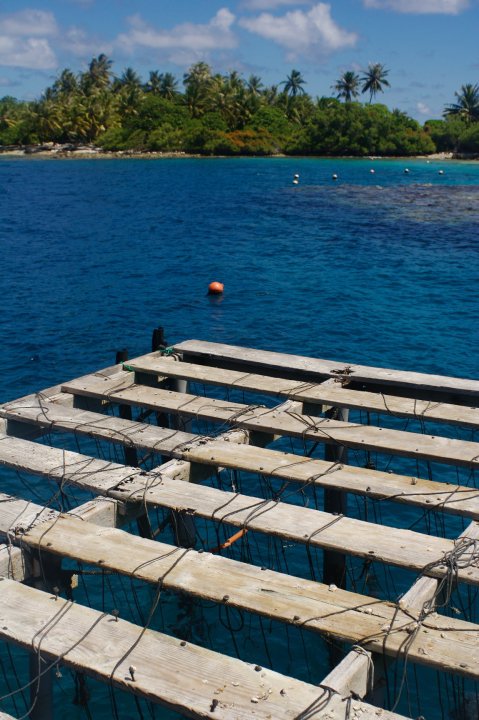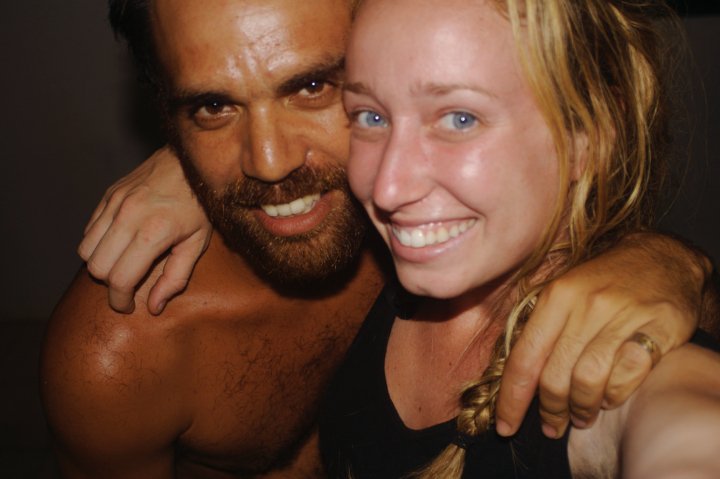I’d never regretted learning Spanish until Tahiti.
I arrived in March of this year, where I planned to spend three weeks working on a black pearl farm on a remote atoll named Ahe. But when I reached the island, its coral ring tucked away in the northeast corner of French Polynesia, I found only four others living on the farm, two Tahitians and two Frenchmen, all of whom spoke English at varying levels of proficiency – from barely to conversationally. Getting beyond that initial bon jour and double-kiss proved a frustrating stalemate. Suddenly I wished the last time I studied French hadn’t been first grade and that I’d spent less time rolling my r’s and more time sleuthing out the infamous French silent letters, or lettres muettes.
I quickly got to know Hei’arii, a 31-year old Frenchman whose English was the strongest and his desire to improve even stronger. While on Ahe,Hei’arii was solely responsible for my French education. There’s not much I love more than learning a new language, and Hei’arii willingly obliged. While standing stand-by-side on the boat every day, hauling in two-meter long wire baskets of oysters from the lagoon, he coached me on the most elementary of topics. Never had learning to count to ten seemed such a feat. I returned the favor when I could, which usually took the form of correcting pronunciation or reversing words in a phrase. “Can you wake up me tomorrow?” he asked one night.
But it wasn’t just a new language, it was a new culture – this hybridized, far-flung French outpost, where you breakfast on coffee and baguettes whilst swatting mosquitos and wiping sweat from your brow. At times, trying to communicate was maddening. Humor was largely nonexistent, and by that I mean of the verbal sort – you know, attempts at quick wit and verbal irony. Slapstick was usually the order of the day, learning to make a fool of yourself for the sake of a smile.
When two Americans arrived on the farm a week or so after I did, it didn’t take long for one to remark, “It’s pretty impossible to crack a joke with them, isn’t it?” Even Hei’arii once said to me, almost apologetically, “I could be so much funnier with you.”
So many jokes were lost, seemingly falling between the cracks of the weathered boards of the farm.
And yet, on the whole, it was a rewarding challenge; communication, that is.
I began to look at the dialogue between Hei’arii and me differently, in that understanding was even sweeter when its opposite was a much more common outcome. I learned not to take the simple matter of being understood for granted.
A few days before I left, I told him that it was going to be the craziest thing to go home and be able to say something without having to repeat it, for someone to instantly “get” what I’m saying. He laughed and shook his head in sad agreement, “I know, I know.” Compatriots in miscommunication. Because, let’s face it, language can be a nightmare. The phrase ‘lost in translation’ conjures scenarios of all types, of bombed punched lines, failed relationships, and missed train stops, and its inherent difficulties come to life in Sophia Coppola’s well-known film of the same name.
As Wikipedia writes, ‘lost in translation’ often describes “cultural references that lose their significance during translation from one language to another.” On Ahe, I would sit for hours around the long wooden table in the farm’s kitchen, listening to Hei’arii and the farm’s manager Laurent talk over coffee and cigarettes. I felt wholly alone in my thoughts – don’t get me wrong, I was the picture of ignorant bliss, listening to the waves beneath us lap against the rhythms of their dialogue, but it was isolating, nonetheless.
But the longer I talked with Hei’arii and the more hours we spent around the farm with our soon-beloved French-English dictionary, I started to think that maybe – just maybe – not everything is lost. In fact, perhaps, there’s even something to be found in translation.
The thought came to me one day as I sat at the table sketching a glass water jug and Hei’arii talked beside me about the classes he’d attended in art school for a year in Paris. He had taken a drawing class on still lifes and told me the phrase in French translates literally as “dead nature.” I began to chew on the end of my pencil, a physical act of digesting what he’d just said. The two phrases reference the same thing, right? And yet the connotations of each are quite different; even the use of ‘life’ in one and ‘dead’ in the other seems to be a complement, a way of elucidating a new side of the story.
When I finally emerged from the technological sabbatical that was Ahe, I started reading more on the French language. I soon came across the term calque, defined by Princeton as “an expression introduced into one language by translating it from another language.” Wikipedia takes this further, writing that a calque is a “loan translation,” a “word or phrase borrowed by another language by literal, word-to-word, or root-to-root translation.”
Common examples of this are the English word ‘superman’ being a calque for the German ubermensch and the English ‘flea market’ having been translated directly from the French marché aux puces – literally, ‘fleas’ market.’ So what about my ‘dead nature’ discovery? I’m not enough of a linguist to know if I’m using the word in the right context, but I still like the idea of ‘still life’ being a calque. I like it enough I might even borrow the idea of borrowing words just to make sure it applies.
I continued to collect calques on the farm. As I went to bed one night, Hei’arii said, “Fais de beaux rêves.”
When – as always – I asked him what that meant, he’d said, “Make a beautiful dream.”
“You mean, like ‘have sweet dreams’?” I asked, anxious to confirm this stunning revelation. Turns out he did, and I delighted in the reversal of what such an ordinary phrase is capable of signifying. Have sweet dreams. Sounds surprisingly passive after the action-packed order of Make a beautiful dream. Even puts the pressure on us, doesn’t it? The outcome of our dreams is in now our hands, not subject to the whims of our subconscious – a lesson for how we live out our daylight hours as well.
Another night, I had the chance to play a guitar and sing several of my songs for the guys on the farm. Later, as Hei’arii and I sat on the floor of his bungalow and rested our heads against the back of his futon, he told me I’d impressed him with my playing.
“Why don’t you try to do it as a career?” he asked.
I sighed, feeling like I was coming back to this question for the hundredth time. I tried to explain the multiple passions residing in my heart and my current decision that music was worth sacrificing for the ability to travel. Hei’arii, himself a designer of exquisite jewelery featuring Tahitian black pearls, understood.
“You’ll be fine, just don’t burn the step,” he said.
“I’m sorry?” I asked, only slightly confused.
“Ne brûles pas les étapes, don’t burn the step. It means, don’t hurry, be an opportunist, you know?” Oh, yes. I know. The advice to not rush life is common counsel, but never had I heard it put so poetically.
And so now I conjecture and hypothesize about the possibility that one language can actually fill in the holes of another. That two definitions can work together and, when married, provide a meaning greater than what either offers us individually. You could almost call it syllabic synergy, the idea that sometimes the space between a conversation can be more than a deep abyss of misunderstanding, where cobwebbed corners are filled with blank stares and the sound of pins dropping.
We talk a lot about barriers when it comes to language, but sometimes you find a bridge instead and you go stumbling across a beautiful link to a new way of thinking.
Sometimes, you find truth in translation.




One Comment
Comments are closed.